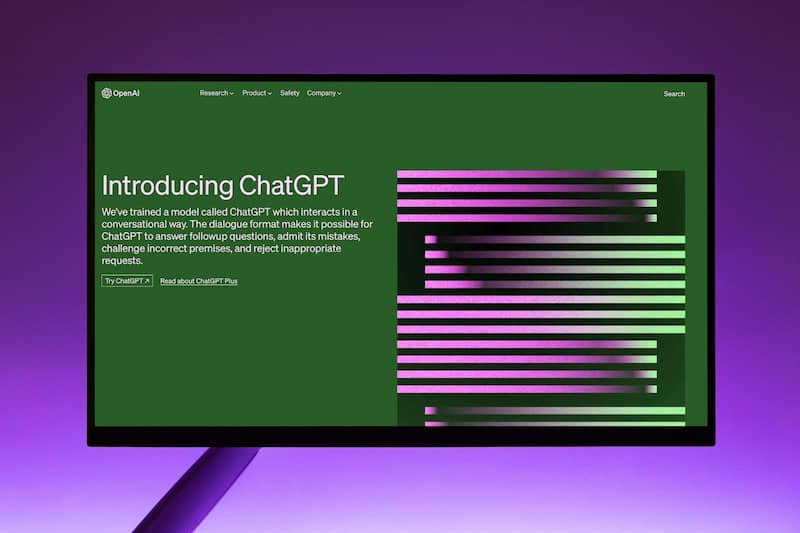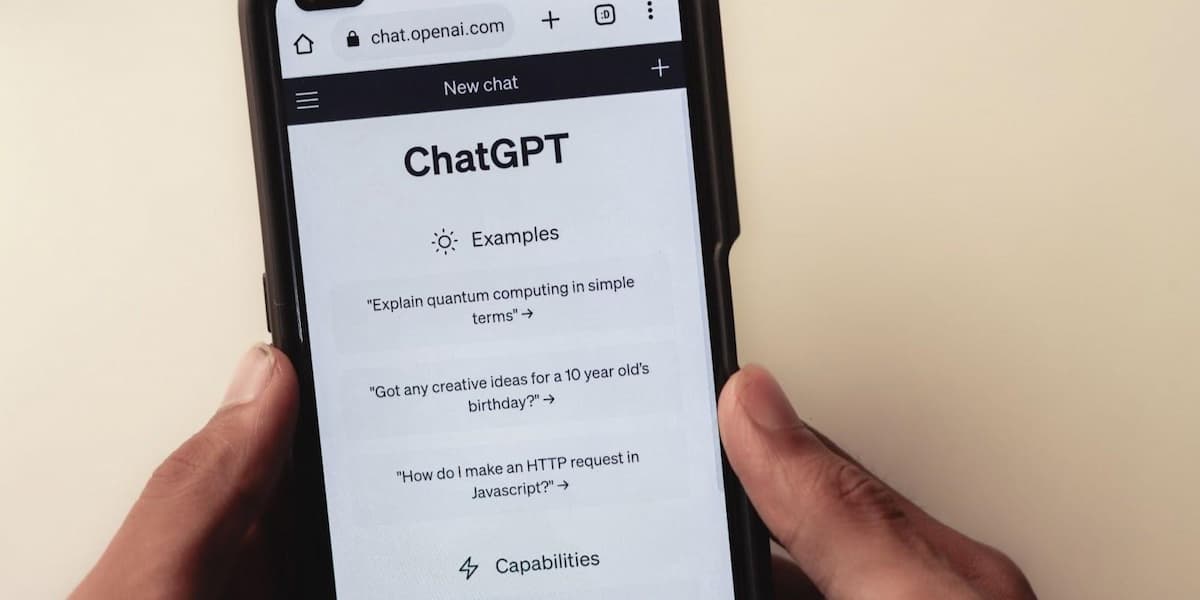ChatGPT Might Do More Harm To Your Business Than Good – Here’s Why
Some hail ChatGPT as their savior, while others warn of its risks…what is it, really?
While the masses celebrate the whirlwind success of OpenAI’s ChatGPT, few are paying attention to the obvious red flags.
Businesses that are too quick to adopt AI chatbots often discover these hazards all too late. Spreading misinformation and exposing company data can ruin your business and is only the tip of the AI iceberg.
Do you use ChatGPT for your business?
You could be risking your company’s reputation and customer base if you allow your new AI chatbot to go unsupervised.
Covering everything from copyright infringement to AI bias, let’s dive into eight ways ChatGPT can damage your business.
Sections
- Inherent AI bias can warp results
- The spread of misinformation
- Unknowingly infringing copyright law
- Lack of compassion in customer service roles
- AI can incorrectly complete tasks
- AI can cause layoffs
- Chatbots can cause data leaks
- ChatGPT breaches data privacy regulations
- How to avoid AI-related dangers while using ChatGPT
- Should you use ChatGPT for your business?
- FAQs about the dangers of ChatGPT
#1. Inherent AI bias can warp results
AI is the brainchild of humans. However, we’ve hardly had a smooth run regarding racial, religious, and gendered bias. Unfortunately, as AI chatbots are in their infant stages, this all-too-human bias is ever-present in AI technology.
You may hope this is hyperbole, but it happened in real life. In 2019, the US Healthcare System adopted an AI-powered risk-assessment tool to identify “high-risk” patients. Using past records (a standard method for AI datasets), the AI showed tremendous bias toward black Americans.
Due to factors like income, hospital availability, and insurance, black patients tended to use more emergency services rather than regular check-ups. This disparity ranked white patients as higher risk, even though black patients had 26% more chronic illnesses.
#2. The spread of misinformation
Whether intentional or unintended, chatbot datasets are easily tampered with. Competitors can easily corrupt entire datasets with falsified data so that your business might spread misinformation.
But here’s the kicker — no one needs to target you for you to spread false data. Due to the state of the internet, fake news is abundant. Chatbots can’t differentiate between real and false without real-life experience, education, or intuition.
This leads many individuals to ask: is ChatGPT actually suitable for content marketing? Used as an aid for data collection and menial tasks, chatbots are unbeatable. If you can utilize ChatGPT in this way, you won’t need to worry about misinformation.
#3. Unknowingly infringing copyright law
ChatGPT’s dataset is a combination of input and publicly available information. However, loads of publicly available data are copyrighted and can cause devastating legal issues for your business if you use it.
Copyrighting in relation to AI-generated content can get tricky:
- Using copyrighted content: Even manipulated content can sound remarkably similar to copyrighted content. Ensure you put all content through a plagiarism checker.
- Exposing your own copyrighted content: Let’s say you enter your blog post into ChatGPT to check for errors. Now, any other user may receive your copyrighted material in response to their own queries.
- Issues obtaining copyrights: Computer-generated content is disqualified from copyrighting in the US. Follow this guide on how your AI-generated content can qualify for copyright.
#4. Lack of compassion in customer service roles
Another issue with early-AI chatbots is a lack of… well, emotion. Not surprising, right? This becomes quite an issue in customer service, as AI is quickly replacing humans in business-to-customer communications.
Chatbots often give awkward and inappropriate answers when handling customer complaints, queries, and reviews. Keeping your clients happy is of utmost importance, so why would you place all of your trust in a chatbot?
Find a nice middle-ground between human-to-human communication and automated replies. Some users distrust AI, so having an available communication line between customers and customer service staff is recommended.
#5. AI can incorrectly complete tasks
While the world is swept off its feet by the abilities of ChatGPT, not many realize that it can, and will, make mistakes. If not monitored properly, you might end up publishing some really embarrassing content.
As mentioned earlier, datasets can include false information, which can lead to drastic mistakes when publishing content. However, mistakes can arise from a number of other issues:
- Misunderstanding of your original search query
- Taking your query too literally
- Lacking a suitable amount of data
- Misunderstanding sarcasm or tone
- AI’s rigidity can cause the production of irrelevant data
Through regular testing and monitoring, you can avoid costly mistakes. Ideally, you want to train your chatbot on a relevant, high-quality dataset to make it suitable for your business’s needs.
#6. AI can cause layoffs
Arguably, the greatest disruptor to the modern workforce is layoffs caused by AI. Just because an AI can do someone’s job doesn’t mean that they’ll do it as accurately and with the same quality.
Layoffs like these can stir disloyalty in your employees as they fear for their livelihoods. For this reason, it’s not a good idea to start replacing as many roles with AI chatbots as you can.
Automation is awesome, and so is the cost reduction when using AI. However, if you prioritize savings over your employees, you can’t expect them to put in 100% or even stick around for the long term.
#7. Chatbots can cause data leaks
Due to the nature of ChatGPT, every piece of data it consumes is added to its growing dataset. Chatbots use these data libraries to learn and evolve, but for those handling sensitive business data, it poses a huge risk.
The benefits of chatbots for workflow are unparalleled. Individuals often enter business data into chatbots for purely benign reasons. With this data added to the AI’s training set, any user can then request the data.
This isn’t hypothetical either — just this year, three Samsung employees exposed company data through ChatGPT. One inserted source code into the chatbot, asking for it to find errors. This sensitive code was instantly made publicly available.
#8. ChatGPT breaches data privacy regulations
Depending on which country your business is located in and who your clients are, you could be breaching data privacy regulations. In Europe, ChatGPT was only recently allowed, as it had to be adapted to suit GDPR laws.
Italy, which only recently allowed ChatGPT, originally found issues based on the following GDPR violations:
- Chatbots can spread misinformation
- Individuals are unaware their data was collected
- There are no age limits or parental controls
- There’s no legal precedent that allows the collection of individuals’ data
If you operate within the EU, lucky you! For anyone else, you’ll need to research the unique data privacy laws of your own country. For citizens of Russia, China, or North Korea, you’ll need to wait patiently for ChatGPT to be legalized.
How to avoid AI-related dangers while using ChatGPT
Luckily, these issues are mitigated through conscientious controls and oversight. When used appropriately, AI can boost your business rather than damage it.
Use ChatGPT in a limited manner for now
For now, think of chatbots as fresh-faced, inexperienced workers. Would you trust a newbie with your entire marketing campaign? I thought not. Implement AI where it’s proven to help, and in a limited sense to begin with.
Any big-picture work should continue to be handled by trained humans until AI has proven itself worthy. At its current state, ChatGPT is an excellent writing and research assistant, but it can’t replace an employee.
Follow AI news and other use cases
This article has already listed the most prevalent ChatGPT issues to rear their head so far. As time goes on, more people will report the issues they’ve faced when using AI chatbots.
Follow AI news and investigate real-life cases where AI tarnishes a company’s reputation. By keeping up to date, you’ll be aware of AI’s flaws and most likely avoid any major reputational damage.
Test, monitor, and fact-check everything
We’ve mentioned it a few times already, but it bears repeating — monitoring your chatbots is crucial. Left unchecked, ChatGPT can cause any number of issues mentioned here.
Use ChatGPT, but use it wisely and with close supervision. Fact-checking is not only recommended but necessary, especially if you quote data from a chatbot.
Should you use ChatGPT for your business?
If you aren’t already, here’s your wake-up call. ChatGPT and similar AI-powered chatbots are revolutionizing workflow for any size of business. Small companies can save manpower on smaller tasks, while large corporations can automate massive operations in a few clicks.
Here’s a handful of companies that are already integrating ChatGPT into their services and operations:
- Microsoft
- Coca Cola
- Expedia
- Duolingo
- Snapchat
Chatbots are an aid, not a sole employee — they can help to:
- Manage your online profile
- Scrape the web for data
- Summarize lengthy articles
The applications are seemingly endless, and we’ll only see more advancements as time passes.
Final thoughts
The vast AI ecosystem is advancing at a rapid pace. So much so that any business not taking advantage of AI may be left behind.
Through careful monitoring and testing, you can use ChatGPT to scale your digital presence and speed up your content creation — all without risking your business’s reputation.
FAQs about the dangers of ChatGPT
How will ChatGPT change business?
AI will form the core architecture for companies to automate large-scale processes in the future. Unfortunately, it will inevitably replace some roles but, in the process, create many more.
Why can’t ChatGPT create all my content?
A huge flaw within ChatGPT is its inability to properly cite information. You might even find that it won’t provide a source at all. To ensure your content remains reputable and accurate, use ChatGPT as a helper, not as a writer.
This highlights an important factor when using ChatGPT for content creation. AI chatbots can be an amazing writing assistant if used in tandem with writers.
Are ChatGPT and other chatbots safe?
To put it simply, yes, chatbots are safe to use in addition to standard cybersecurity tools like antivirus, a VPN, and strong password security. These safety precautions are especially important when trying out chatbots other than ChatGPT.


